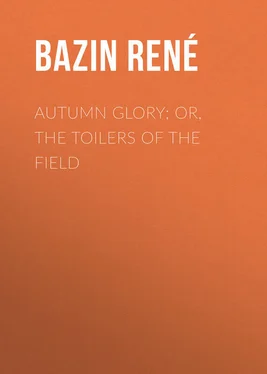René Bazin - Autumn Glory; Or, The Toilers of the Field
Здесь есть возможность читать онлайн «René Bazin - Autumn Glory; Or, The Toilers of the Field» — ознакомительный отрывок электронной книги совершенно бесплатно, а после прочтения отрывка купить полную версию. В некоторых случаях можно слушать аудио, скачать через торрент в формате fb2 и присутствует краткое содержание. Жанр: foreign_language, foreign_antique, foreign_prose, на английском языке. Описание произведения, (предисловие) а так же отзывы посетителей доступны на портале библиотеки ЛибКат.
- Название:Autumn Glory; Or, The Toilers of the Field
- Автор:
- Жанр:
- Год:неизвестен
- ISBN:нет данных
- Рейтинг книги:3 / 5. Голосов: 1
-
Избранное:Добавить в избранное
- Отзывы:
-
Ваша оценка:
- 60
- 1
- 2
- 3
- 4
- 5
Autumn Glory; Or, The Toilers of the Field: краткое содержание, описание и аннотация
Предлагаем к чтению аннотацию, описание, краткое содержание или предисловие (зависит от того, что написал сам автор книги «Autumn Glory; Or, The Toilers of the Field»). Если вы не нашли необходимую информацию о книге — напишите в комментариях, мы постараемся отыскать её.
Autumn Glory; Or, The Toilers of the Field — читать онлайн ознакомительный отрывок
Ниже представлен текст книги, разбитый по страницам. Система сохранения места последней прочитанной страницы, позволяет с удобством читать онлайн бесплатно книгу «Autumn Glory; Or, The Toilers of the Field», без необходимости каждый раз заново искать на чём Вы остановились. Поставьте закладку, и сможете в любой момент перейти на страницу, на которой закончили чтение.
Интервал:
Закладка:
Autumn Glory; Or, The Toilers of the Field
CHAPTER I.
LA FROMENTIÈRE
"Quiet! Bas-Rouge, down! Don't you know folk born and bred here?"
The dog thus addressed, a mongrel in which some twenty breeds were mixed, with grey long-haired coat changing to auburn silky fleece about the paws, at once left off barking at the gate, trotted along the grassy path bordering the field, and, content at having done his duty, sat down at the extreme edge of the line of cabbages which the farmer was trimming. Along the same path a man was approaching, clad in gaiters and a suit of well-worn corduroys. His pace was the even steady gait of a man accustomed to tramp the country. The face in its setting of black beard was drawn and pale, the eyes, accustomed to roam the hedges and rest nowhere, bore an expression of weariness and mistrust, the contested authority of an agent. He was the head-keeper and steward to the Marquis de la Fromentière.
He came to a halt behind Bas-Rouge, whose eyelids gave a furtive quiver, though his ears made not the slightest movement.
"Good day, Lumineau."
"Good day."
"I have a word to say to you. M. le Marquis has written."
Probably he expected the farmer to leave his cabbages and come towards him. Not a bit of it. The yeoman of the Marais bending double, a huge bundle of green leaves in his arms, stood some thirty feet off, looking askance at the keeper waiting motionless in the path. What did he want of him? His well-fed cheeks broadened into a smile, his clear, deep-set eyes lengthened. In order to show his independence, he bent down and resumed his labours for a moment without reply. He felt himself upon the ground that he looked upon as his own, which his race had cultivated by virtue of a contract indefinitely renewed. Around him, his cabbages formed an immense square, a billowy mass of superb growth, firm and heavy, their colour comprising every imaginable shade of green, blue, and violet, tinting in harmony with the hues of the setting sun. Of huge stature though he was, the farmer plunged to his middle, like a ship, in this compact sea of vegetation. All that was to be seen above it was the short coat and round felt hat, set well back on his head, from which hung velvet streamers, the headgear of La Vendée.
When by this period of silence and labour he had sufficiently marked the superiority of a tenant farmer over a hired labourer, Lumineau straightening himself, said:
"You can talk on; there's no one here but me and my dog."
Nettled, the man replied:
"M. le Marquis is displeased that you did not pay your rent at Midsummer. It will soon be three months in arrears."
"But he knows that I have lost two oxen this year; that the wheat is poor; and that one must live, I and my sons, and the 'Creatures.'"
By "Creatures" the farmer meant, as is customary in the Marais, his two daughters, Eléonore and Marie-Rose.
"Tut, tut," replied the keeper, "it is not reasons he wants from you, my good man, it's the money."
The farmer shrugged his shoulders.
"Were he here at the Château the Marquis would not require it; I would soon explain how things stand. He and I were friends, I may say, as his father and mine were before us. I could show him what changes time has brought about with me. He would understand. But now one only has to do with paid agents, no longer the Master; he is no more to be seen, and some folks say we shall never see him at La Fromentière any more. It is a bad thing for us."
"Very likely," returned the keeper, "but it is not my place to discuss orders. When will you pay?"
"It's easy to ask when will you pay, but it's another thing to find the money."
"Well then, I am to answer, No."
"You will answer, Yes, as it must be. I will pay at Michaelmas, which is not far off now."
The farmer was about to stoop to resume his work when the keeper added:
"You will do well, too, Lumineau, to look after your man. I found some snares the other day in the preserves of La Cailleterie, which could only have been laid by him."
"Had he written his name upon them?"
"No. But he is known to be the most desperate poacher in the country round. You beware! The Marquis has written to me that you were to go out, bag and baggage, if I caught any one of you poaching again."
The farmer let fall his armful of cabbage leaves, and extending his two fists, cried:
"You liar! He cannot have said that. I know him better than you do, and he knows me. And it's not to a fellow of your sort that he would give any such instructions. M. le Marquis to turn me off his land, me, his old Lumineau! It is false."
"Those were his written instructions."
"Liar!" repeated the farmer.
"All very well; we shall see," quoth the agent, turning to resume his way. "You have been warned. That Jean Nesmy will pay you a bad turn one of these days; without taking into account, that for a penniless lad from the Bocage, he is rather too sweet on your daughter. People are talking, you know."
Ramming his hat down on his head, with crimsoned face and inflated chest, the farmer advanced a few steps, as though to fall upon the man who had insulted him; but he, leaning on his stout thorn stick, had already walked on, and his discontented face was seen outlined against the hedge as he rapidly receded. He had a certain dread of the colossal farmer whose strength was still formidable despite his years, and, moreover, an uneasy sense of the past ill success of his threats, a recollection of having been, more than once, disavowed by the Marquis de la Fromentière, their joint master, whose leniency towards the Lumineau family he never could understand.
The farmer stopped short, following with his eyes the head-keeper's receding figure. He watched as it passed along the fence in the opposite corner to the gate, scaled it, and disappeared to the left of the farm buildings along the green path leading to the Château. When he had watched the man finally out of sight:
"No," the farmer exclaimed aloud. "No, the Marquis did not say it! Turn us out!"
For the moment the agent's evil insinuations against Marie-Rose, his youngest daughter, were completely forgotten, his mind wholly absorbed in the threat of being turned out. Slowly, with a harder look in them than was their wont, he suffered his eyes to wander around, as if to call all the familiar objects to witness that the man had lied; then, stooping down, he resumed his labours.
The sun, already low in the heavens, had nearly reached the row of young elms which bordered the field to the west, their lopped branches that ended in tufts of leaves resembling huge marguerites were bending to the strong sea breeze. It was the beginning of September, the time of evening when a glow of heat seems to traverse the descending chills of night. The farmer worked on as quickly and unremittingly as any younger man; his outstretched hand snapped off the crisp leaves close down to the stem of the cabbages with a noise as of breaking glass, where they lay in heaps along the furrows beneath the over-arching rows of plants. Hidden in the gloom, whence was emitted the warm, moist smell of earth, he was lost amid the huge velvety leaves intersected with their purple veins of colour. In truth he made one with the vegetation, and it would have been difficult to discern which was corduroy and which cabbage in the billowy expanse of the blue-green field.
Withal, close to earth as was his bent body, his soul was agitated and deep in thought; and as he worked, the farmer continued to ponder many things. The irritation caused by the keeper's threats had subsided; it only needed reflection to dismiss all fear of hard treatment from the Marquis. Did they not both come of a good stock; and did they not acknowledge it, one of the other? For the yeoman's ancestor was a Lumineau who had fought in the great war; and although now in these changed times he never mentioned past glories, neither the nobles nor the peasants were ignorant that his ancestor, a giant, surnamed Brin d'Amour, in the war of La Vendée, had taken the generals of the insurrection across the marshes in his own punt, had fought brilliantly, and had received a sword of honour, which now hung, eaten with rust, behind one of the farm presses. The family was one of the most widely connected in the country side. He claimed cousinship with thirty farmers, spread over that district which formed the Marais, extending from Saint Gilles to the Ile de Bouin. No one, himself included, could tell at what period his forefathers had begun to till the fields of La Fromentière. They had been there of right for generations, the Marquis in his Castle, the Lumineaus in their farm, united through long custom, each knowing the land and alike loving it; drinking the vintage of the soil together when they met; never dreaming that one or the other could ever forsake Château or farm bearing one and the same name.
Читать дальшеИнтервал:
Закладка:
Похожие книги на «Autumn Glory; Or, The Toilers of the Field»
Представляем Вашему вниманию похожие книги на «Autumn Glory; Or, The Toilers of the Field» списком для выбора. Мы отобрали схожую по названию и смыслу литературу в надежде предоставить читателям больше вариантов отыскать новые, интересные, ещё непрочитанные произведения.
Обсуждение, отзывы о книге «Autumn Glory; Or, The Toilers of the Field» и просто собственные мнения читателей. Оставьте ваши комментарии, напишите, что Вы думаете о произведении, его смысле или главных героях. Укажите что конкретно понравилось, а что нет, и почему Вы так считаете.












